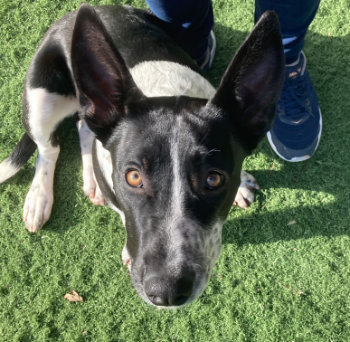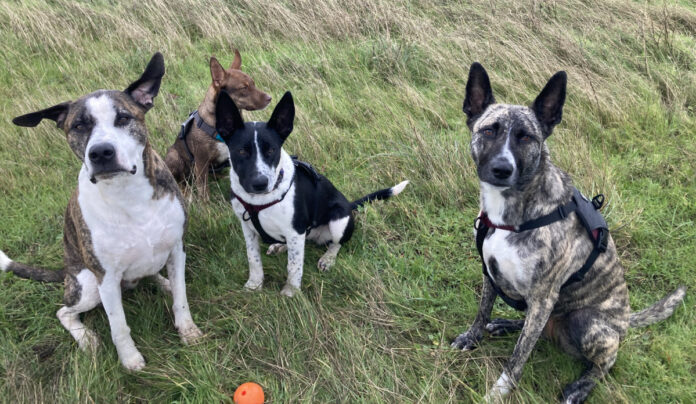Anyone who knows me knows that I love to make matches between the right humans and the right dog. When a friend asks for help finding a dog, I’ll scour my local shelter, peruse the web pages of my favorite Northern California rescue groups, and pay special attention when I see a post from acquaintances or trainer friends who are trying to help find a home for a certain dog. I love the challenge of making a good match – and the prospect of getting one out of a shelter!
At the same time, I will tell my dog-hungry friend to BE PATIENT, because it’s been my experience that once people make the decision to get a dog, they are often over-eager to bring one home, even when the dog doesn’t feel like the best fit. I can’t tell you how many times I’ve seen this scenario: A friend asks for help finding a dog. A week later, I get an email from that friend saying “Never mind! I found one!” and photos of their new dog. And then, a day or two later, I get a phone call from the same friend, saying, “Oh my gosh! I need help! This dog is a lot more than what I was expecting!”
Sometimes, it’s a matter of a fairly good match; it’s just that the person sort of forgot what it was like to have a young untrained dog or puppy (maybe they recently lost an older dog, so it’s been a decade or more since they’ve had to deal with a dog who hasn’t been taught any sort of house rules yet). But more often, I find, the people who adopt quickly, tend to adopt a dog who doesn’t even slightly resemble the criteria for their dream dog that they gave me!
If they are really out of their element or feel a deep mismatch with the dog, I would so much rather that they realize their mistake and return the dog than to keep him or her for months (or even years) – and THEN decide they can’t keep the dog. The older a dog gets, the more difficult it is to find him or her a new home, particularly if he’s not trained. Let him be rehomed while he’s still familiar to the staff of the shelter or rescue who placed him! Give them honest and open feedback about what didn’t work for you, what behaviors you found difficult, so they can try to find him a more suitable placement next time!
Even though I think it’s better to return a mismatched dog sooner than later, even if it takes months (or years, though I hope not!), I think it’s better to try to find a happy home for a dog than to keep one that you don’t enjoy or who doesn’t enjoy you. Spending an unhappy, ill-matched lifetime together doesn’t do the dog or the dog owner any favors. To me, it’s the saddest thing ever to witness a dog who was relegated to a 24/7 outdoor life (or life in a garage, which I’ve seen, too!) because someone – years earlier – couldn’t manage to housetrain them or teach them indoor manners such as refraining from counter-surfing or not jumping all over the furniture.
There is so much stigma about rehoming! People often feel like failures to “give up” on a dog, or to admit they are afraid of the dog, or just don’t feel comfortable with him or her. Others worry that the dog’s prospects will be reduced (or ended) by being returned or rehomed. But if I were a dog, I wouldn’t want to be unloved or untrusted for the rest of my life! I’d rather take my chances of finding an owner who knows more about dogs like me!

One of my trainer friends is trying to find a perfect home for one of her clients’ dogs right now – an adorable little dog who has proven to be a bit reactive when on-leash and beyond the ability of her family to handle appropriately. My friend has fostered the little dog for a few days, to get a complete picture of her leash-reactive behavior, and says the behavior will be easy to modify in the right hands and home; now we just have to find that home.
I was prompted to write this post because I JUST experienced a scenario like the one I described at the beginning. I was keeping my eye peeled for a dog for a friend; she wanted a dog around 25-30 pounds, adult, and calm. Two weeks into her search, she announced she had adopted a 40-pound, 6-month-old, Cattle dog-mix. YIKES! I have to say, the dog was one of the calmest 6-month-old Cattle Dog-mixes who just spent a month in a shelter that I have EVER met (which is what fooled my friend into thinking it might work out) – but she is still an adolescent herding breed.

Within 24 hours, the dog had terrorized my friend’s cat, refused to pee outside, sneaked a few pee puddles inside, and is showing no signs of having to poop, EVER (so we knew it would come sometime, likely in the night, lol). She chewed some things, knocked over things, and generally acted like who she is. And my friend, who only recently lost a well-behaved 13-year-old dog, was in shock – but fortunately, she realized her mistake quickly and asked me for help. She wanted to know whether the dog’s prospects would be harmed by going back to the shelter (nope!) and whether I thought that was the right decision (yes!).
But coincidentally, I knew a trainer who had recently lost her older dog and was maybe casting about for a new companion. I asked the shelter if I could foster the dog for a few days and make the introduction – and when I did, sparks flew. This beauty is now living her best life in a home of a trainer who recognizes and appreciates her super smarts, joy of learning, and playful zoomies and isn’t put off by her adolescent chewing and digging.
Yay! One dog out of the shelter and into a PERFECT home, and one friend educated about the importance of being patient and waiting for just the right dog to come along. Now if we can just find a spot for the cute little reactive dog…






Thank you for reducing the stigma of rehoming when it is in the best interest of the dog and family. If a rescue isn’t available and when shelter returns are not ideal, there are websites like Rehome.AdoptaPet.com that can help owners find a new adopter.
I kind of fall into that category. Once I decided I did want another dog, I got one off Craigslist! I contacted the lister and, once I said we were retired and lived on five acres, they threw the dog into the car and brought him to me! I thought we’d do a meet and greet first, but, nope, a three-hour drive later and I had a dog. I couldn’t say no. He was a very cute, friendly, small Golden Retriever who was waaayyy too thin at 14 mos.
Once I got him, I found out that he wouldn’t eat the food he came with (“he eats when he wants to”) but he also had pica AND a sensitive stomach. He eats grass in all its various forms (dry, fresh, fermented, and pre-digested). I have horses and he’ll scarf up manure if given a chance. He stripped the mower deck on the tractor of all grass-type remains.
If sorting out what food he would and COULD eat without repercussions, he also bit – seriously – if held under restraint, biting two people and sending them to the ER.
But once we consulted a vet behaviorist, put him on meds (fluoxetine and gabapentin), and picked away at behaviors with positive reinforcement (which I was already fluent in with horses), he is now a great dog, albeit one that I don’t walk on the street because of dog aggression (he was never properly socialized). We are working through Cooperative Care Certification and he now how his Level 1 Basic.
I’ve had him for 2 1/2 years now and he is, at heart, a clown.
What a great home this dog has!! And how lucky you both are.
Thank you for being so patient with this pup and not giving up!
Thanks for pointing out how important it is to match dog to family. I just got back a smart, sassy and very energetic Husky mix from foster to adopt with an older woman who fell in love with her but soon realized it was more pup than she could handle. It was a good experience for the pup as she learned some good behaviors, but the woman felt bad. I was grateful she realized it wasn’t a good match while pup is still young enough to be easily placed—in fact she is going to a trial home today with a young active family that is likely to be a much better fit. The mistake some people make is to just start ignoring the dog or deciding it is hopeless when it is actually just not the right fit.
We had lost our previous dog and I desperately wanted another. I thought I had waited long enough (3-1/2 months) but I fell for the looks of a young adult at a rescue and ignored the warning signs. I had zero knowledge or experience and didn’t know what “reactive” meant so I thought it would be fine.
It has been really, really rough. I’m now happy we have him but for the first two and a half years, I wished we had returned him to the rescue (which is now defunct). We found a great positive reinforcement trainer who specializes in reactive dogs and have a great vet behaviorist. He’s on two medications daily. We can’t get within 60 feet of an unknown dog while we’re out on a walk but that is better than the 200 yards it was initially.
We’re lucky to have a huge fenced yard for him to play in but he must be supervised at all times because the German Shepard next door barks and gets our guy riled up.
So many lessons learned. Don’t adopt because you are desperate. Take your time and find the right dog. Don’t compromise. When the rescue/shelter gives you clues about behavior, really dig in and find out what they mean. Be prepared to do a lot of work if you have a difficult dog. Listen to your gut and never work with a trainer that uses harsh methods no matter what they tell you or how highly they are recommended.
Thanks for writing this article.
I was so fortunate that my latest adoption turned out the way it has. My last two dogs were rescued chocolate lab mixes – 80 or 90# each. After my Suzy dog was put to sleep (13) I lasted about two weeks & started going to the local humane society & met several dogs. Then saw Axel (lab-mix?) on their website – went & met him & adopted him. He was 8 & very thin, had bad flea infestation – brought him home & he now has gained 15 pounds – wonderful coat & the most loving dog he could be. I agree that if anyone is accustomed to an older dog, getting a puppy & starting all over, especially as a senior is not likely to work out – for the dog or person. There are so many older dogs looking for homes.
Thank you for your article on rehoming. I let myself be talked into adopting an untrained 10 month old St Bernard. I thought all I needed to do was attend some training classes and practice with him, and all would be fine. We made a LOT of progress but I wasn’t skilled enough to manage the reactivity (I probably induced it) behavior. Then he started to be overly “protective of me” and would lunge at anyone who was walking/running in my direction. One day I lost control and he lunged at a fasting walking neighbor when she came within a few feet of me and knock her over, ruined her coat, broke skin on her hand. Another day he got out the front door and bruised an older man just jogging in front of the house. I looked for 3 months to find a woman who had big dogs all her life, loved Saints and had been a dog handler on dog shows. He now lives very happily with her and her husband, 2 kids an 4 cats (go figure). They love him dearly and is an important part of their family. Rehoming doesn’t have to be bad. I think I suffered more than the dog. Any confidence I had as a pet owner has been eroded and I’m afraid “to ruin another one.” May seem silly, but that’s my reality
Good advice. When I finally agreed with my Springer’s physical therapist that it was time, we surrounded him with soft light ,
music and us and said goodbye to Michael. I was immediately depressed. I don’t do well without a dog. I heard of a new breed, the Brittany and NBRAN, National Brittany Rescue and Adoption Network. Still a hunting breed but a good 20# less and of course shorter. The rescue group came well regarded so I looked at what they had. A woman in my state was sent to meet me and assess the home, the fenced yard, and me. She then did her do diligence on the fosters they had that were ready to rehome to the right new home and owner. I admit I was looking for a handsome dog like my Michael had been and without excitement agreed on her pick. Senior for senior. When he curled up right under the Christmas tree he portrayed what he became to me. A gift. Couldn’t have found a better boy for me. He was everything I needed and wanted. Still is.
How absolutely beautiful! Thank you for sharing this – the flip side of the coin.
My only wish is that many of the smaller/local rescue organizations felt the same way. Most are very good about taking back a dog that isn’t working out but I have had personal experience with one group that basically blacklisted me when I called to say it was not working out. I loved the dog, but the new dog did not like our existing dog. We worked for several weeks trying to figure out if this was something we could resolve, in the end the new dog was determined to bully our sweet pup 24/7. We had to keep them separated at all times, and the new pup was crated way more than I wanted her to be. The worst was how scared and miserable by existing pup was.
The real issue is with rescue organizations that don’t allow for meet and greets. Sure if you are adopting and its the only dog in the house that might work out but as I learned not every dog is meant to be part of a multi-dog household. I know they rely on fosters and don’t have funding or resources to house returns etc… but they really need to be more supportive of re-homing.
The happy ending is that I worked with the MSPCA adoption staff and ultimately found the perfect little buddy for our sweet girl. Ironically, our new guy had been adopted and returned for some behavioral issues. We addressed those issues immediately and he is a steadfast member of our household now.
This is so true, small rescues will often blacklist you for returning a dog. I have worked with a couple who will let you foster and try to get existing dogs and new dogs to get along, but if they don’t, they don’t have many options for the foster other than full time boarding. While this is sad for the dog, it can be a deterrent to fostering or adopting from smaller rescues. And dog rescue, especially pitbull types, is an especially catty, accusation-prone sector.
I teach training classes and last session had a lovely woman (mid-60’s) show up with a year old Lab mix she’d gotten from a shelter in a neighboring county. The dog did nothing but drag her around lunging and barking. I actually had to keep them separated from the rest of the class because the dog was completely unmanageable.
Now, this was not mean dog just way too much for her. We discussed it and after 3 classes she decided it was best to return the dog. She now has another Lab puppy that is absolutely perfect for her. They do well in training and take daily 2 or 3 mile walks. She made the best decision.
I did all of the wrong things but it has worked out for everyone.
I wasn’t even looking for a dog. I was just surfing one night after a discussion about dog birthdays. Yes, I know Diana pawPrint’s birthday and we do celebrate it. She, her Mom and litter mates were rescued from the Hesperia, CA shelter. I got out her binder and looked at her intake photo. Then I decided to go to the Hesperia website. I clicked on adoptable dogs and at the top were three dogs that had been “red-carded.” The middle one looked like my childhood Keeshond mix. What could possibly be wrong with this dog? I contacted the shelter through e-mail and phone and when I finally got a reply was told destructive behavior. Well, Keeshonds don’t do well being left alone all day. I’m retired and home all the time and I have Diana. I am an experienced dog owner. Separation anxiety would not be an issue. And I didn’t want this dog killed because the owners worked all day. So I piled Diana in the car and we made the three hour drive to meet her. She was gentle, loving, clingy even. They got along fine. Turns out she had been returned twice, the second time within 24 hours. I can guess. She was adopted because she was cute and they left her in an apartment or house all day while they were at work and came home to a disaster area. $90 later we were driving back. She slept all the way back and didn’t do anything in the car. The first few weeks were an adjustment period, with a bit of trash digging and some chewed clothes. But she learned the routine of the house and in the last six months has really blossomed. She is still affectionate but I don’t get the manic spinning and jumping to greet me that we started with. She is now sleeping in her dog bed instead of on the floor and sometimes I catch her on her back, belly exposed. She knew nothing when I got her, not even her name but she answered to her new name within three weeks. She now will sit on command. She had no leash skills but is improving there too. Thankfully she was already house trained.
Yes, I did all of the wrong things. I wasn’t looking for a dog, then I adopted a dog with little history based on looks and what I thought was her breed. Turns out she is a husky mix, not Keeshond. But it is still an excellent match. And she has no idea how lucky she got, hitting the rescue lottery.
Thank you for not returning her after 24 hours. This article seems to encourage people that it’s better to return the dog immediately rather than give it time. There is a transiton period for dogs going from a shelter to a home. They could have had many transitions over the past several weeks or months and are under a lot of stress. It’s very important to allow them time to acclimate. I work at a shelter. Our amazing Adoption team counsels adopters extensively and tries to make the best match possible. But still, we often get calls after 24 hours saying, “This dog is crazy! I think I made a mistake!” We send them to our Behaviorist who talks to them about decompression and what they can to do help their dog settle into their new environment. A week later they call and say, “This is the best dog ever, I can’t believe I was considering bringing him back.” We always tell adopters that the first few days or even weeks will be a challenge as the dog re-learns what it’s like to be in a home, settles into a routine, and bonds with the family and resident pets. So I would say please do not return your adopted dog immediately, give it time, if after a few weeks they are still more than you can handle and you are unwilling or unable to work with them and continue their ongoing training, please bring them back. We offer lifelong behavior support to all of our adopters and have an incredible Adotpion team who truly cares. We have one of the lowest return rates in the country.
If you have ever gotten a dog from a rescue (especially pitbull type dog rescues) and you even hint that you may want to rehome your dog for any reason, you will be attacked and vilified as a bad owner, someone who didn’t understand the years long commitment that a dog is and a person unwilling to “do the work” to make the home suitable. There are people who crate and rotate multiple bully breed dogs and therefore will tell you not to get a dog if you aren’t willing to do anything and everything under the sun and keep it. This article was such a relief to me. I often have wanted to rehome one of my dogs (my 24 year old son would probably move out with her before letting that happen) but just the thought of it had me feeling like a terrible person. The bottom line is, once she and my son move, she will be much happier being an only pet that can occasionally play with lower energy, well balanced dogs. Thanks for this.
Rescue groups are wonderful, marvelous people but often with more heart than experience and they do not ask the tough questions!….. size, gender, age, is NOT enough! I bred, trained, showed my own Norwich Terriers (with a decent admixture of standard poodles, a mastiff, Portuguese Water Dogs) but age creeps up and I knew I would not outlive a puppy so appealed for small senior dogs and now have two marvelous Rescues (one Heinz 57, one terrier mix), but only after knowledgeable and serious observation of the dogs themselves. You would do a great service to dogs and their human pets were you to compose two checklists, one for the potential owner addressing the difficult questions and one for the dog re h/h past homes, training, medical probs, anything that can be wormed out of the previous owner (why would they not tell?) or the Foster Family (again, such wonderful, caring folk). Any shelter or Rescue who would not allow a meet/greet or a probation period is not one I would deal with! Nancy, do a checklist and make people think about the potential difficulties!
I have a question: My friends bought a puppy from a designer dog breeder 7 months ago, an AussieChon (mini australian shepherd and Bischon Frise). She has always been a tiny bit fearful of meeting new people but now she is aggressive toward strangers and chases cars and not housebroken. She is very sweet when I have kept her but we can’t take her for walks. She will lunge and growl at cars and people from far away and up close, seems like she looks for them. I’ll spare you one horror story. She has about 50 friends that are part of her pack but seems to know who isn’t. She lives with a very active family with three children 4, 7 and 10. The pup was bought for the 10 year old but mom takes care of it quite a bit plus her other responsibilities. The parents are trying their best to train Toka but these few issues are impossible for them and they want to re-home her. I’m helping my friends and was wondering what I can do. You have any thoughts, Nancy?
Try Paul Owen’s books. He give good advice re helping to calm reactive dogs.
Look-away technique. Will take several months, be consistent.
I do think one problem is the rhetoric one gets from rescue organisations that it is best to
“adopt” an older dog because “it is already trained”.
Discarded dogs almost invariably come with problems — maybe the dog’s personality, but more likely from having been with people who knew nothing about training dogs.
Hi. Thank you for your article. I am now 2 1/2 yrs into owning a mismatched rescue. He is. Mix of many breeds and is approx 27” and 75 lbs. I am 72 and 5ft tall.
When he arrived at 5 mos as a rescue from out of state he was bigger than I thought. The site had pictures of him from 2 mos old But did not say that so I based size expectations on that. He is a really sweet boy but has been reactive from the start. Keeping in mind I’ve had 13 other dogs including pitbull, Rhodesian ridgeback,Rottweiler,lab etc., I figured I would get some training for the both of us and all would be good. Now he’s 3, listens really well inside, walks on a leash like a pro as long as no dogs come within 100 ft, and does really well at dog park except foe some off days when he is very cranky and has to go home. I have feelers out to rehome him before he kills me( I have fallen several times while on walks due to other dog reactivity) l have realized I should have returned him within the first yr but now it’s too late so I make provisions like a yard, walking during times when other dogs are scarce and continuing to get both of us training. I love him dearly but I am definitely paying for my mistakes!